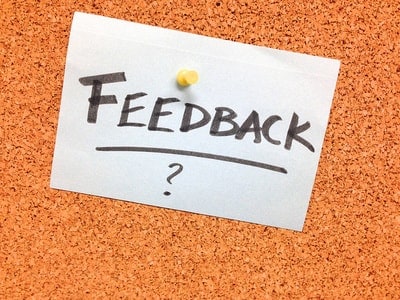Without honest, constructive and engaged feedback there can be no learning. You need to know whether to continue and all is well – or whether to adjust what you do.
Feedback is simply information from the system. When you go bowling feedback tells you how many bowling pins you floored. Your HR dashboards tell the number of sick days and retention rates, the accounting department supplies financial feedback.
Human feedback tells you something about the needs of the other – and that is crucial if we want to connect and learn. This is one of the most important skills for positive agents and that’s why I regularly spend a whole day on the beliefs and behaviors of receiving and giving feedback with clients.
Feedback helps to value yourself, assert yourself, to open up and be courageous, to connect and to learn. At the same time, it helps to respect others, connect, and keep them open and support them.
That all sounds great but why then, are many people scared of getting feedback? Most people are terrified, so that’s nothing to be ashamed of.
Feedback is learning
Being able to receive feedback is a vital skill: it literally kept you alive till now. You adjusted your behaviors based on positive and negative feedback. That is how you learned. Your exams gave you feedback, your parents did, the hot flame that burned your hand did.
Many of us are afraid of feedback because it used to hurt. We took it too personally and, often, it was given in a personal way. It threatened your fragile identity as a child if your teacher said: You are dumb. If your parents said: You are clumsy. You are not good enough.
Phrased this way, the feedback was given on the identity level. Your Ego got scared and tried to protect you. Such personal feedback triggers the basic five fears of death, scarcity, abandonment, humiliation and shame, and absurdity. It says that we are not worthy: we ARE not okay. This is a threat to our identity, at the level of being.
It is a skill to give feedback on the level of doing: what others could do better. It is also a skill to receive clumsy feedback on the identity level and not “take it in” but translate it to behaviors and competencies that you can train.
I’ll look at that in the next post. For now, what are you afraid of regarding feedback? Can you do something about those fears? What was the best feedback you ever received?
This is book post #62 – Part “YOU”
Here‘s the earlier post
Here‘s the next post
If you’re confused – please start with post #1 or check the Positive Power overview and read the Positive Agent Manifesto.
PS: Do my blog posts and my culture work bring you value? If so, please vote for me at Global Gurus. I’m included as an Organizational Culture Guru. Scroll to the bottom and register to vote. A high ranking helps me to reach more people and develop more positive workplaces! With gratitude, Marcella
By the way, if you want to contribute to a positive workplace culture, my next open workshop on Positive Culture Change Leadership is scheduled for May 2018! More information and registration is available on a first come first serve basis.
Leaders, employees, consultants, citizens – everyone can make a positive difference from any position, without needing permission or resources from others. This blog will help you see positive possibilities and (re)claim your positive agency. Unstuck yourself and engage others via your interaction and actions. Transform into a positive organization where people and performance thrive.
I’m blogging my next book: “Positive Power at Work – How to make a positive difference from any position.” Your feedback is appreciated!

2 Responses
Thank you for this great article! This paragraph resonated deeply with me.
“Feedback helps to value yourself, assert yourself, to open up and be courageous, to connect and to learn. At the same time, it helps to respect others, connect, and keep them open and support them.
That all sounds great but why then, are many people scared of getting feedback? Most people are terrified, so that’s nothing to be ashamed of.”
As The Original Book Coach, I read this article with interest. In my group coaching sessions, I taught the participants the “Oreo Cookie Feedback Method.” Anyone can see these tips when they go to my website.
Thanks, Judy! Feedback is fascinating, isn’t it? So much to learn and we keep learning.